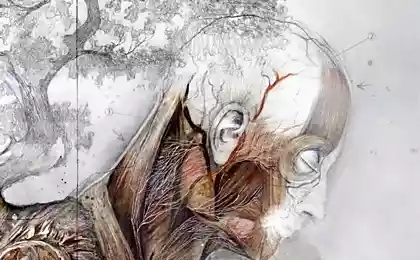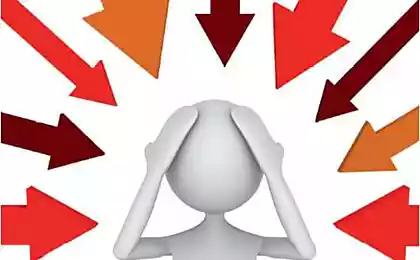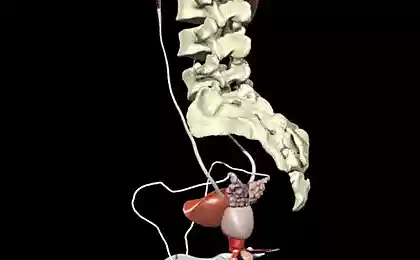69
The Three Strongest Negative Emotions and How to Deal With Them
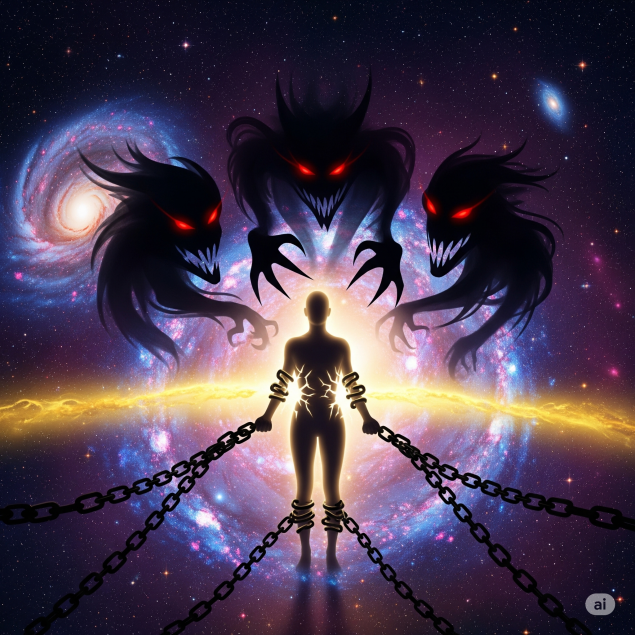
Imagine a situation where you are facing an important decision that could change your entire life. And suddenly something clicks inside, the mind becomes clouded, and you act not as a sentient being, but as a puppet controlled by invisible threads. Familiar? Welcome to the world of humanity’s three most destructive emotions: fear, anger and lust. These ancient evolutionary programs can make the brilliant analyst an impulsive savage and the rational man a slave to his instincts.
Emotions are not enemies, but rather messengers bringing bad news. Unfortunately, the extracted information is analyzed later, when the emotional state returns to normal.
The Anatomy of Emotional Capture
Every day a person goes through a whole palette of emotional states - from morning apathy to evening euphoria. Most of them are fleeting like clouds in a clear sky. But there are three special emotions that can completely take over the mind, turn off logic and turn the most reasonable person into a machine for making disastrous decisions.
What makes these emotions so dangerous? First, they narrow the focus of attention to one object or event. Secondly, they create internal pressure that requires immediate surge. Third, they drastically change priorities – something you didn’t think about a minute ago suddenly becomes the meaning of life.
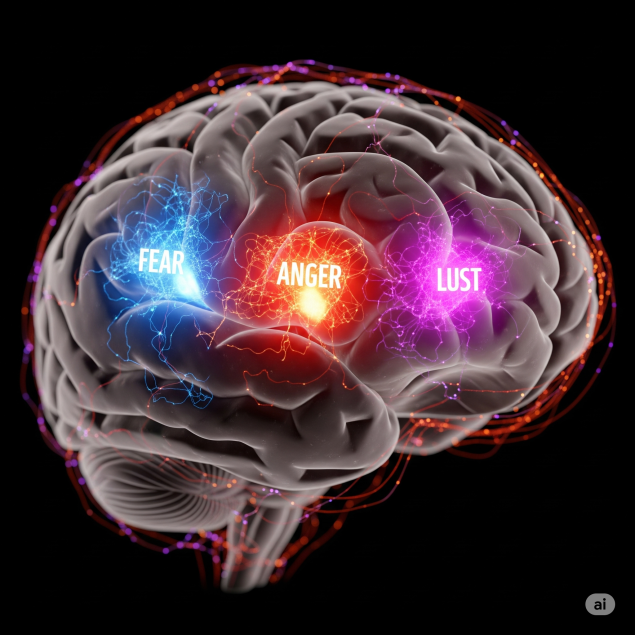
Fear: The Ancient Survival Regime
Mechanism of action
When the brain identifies a threat—whether it’s a growling dog or the boss’s disapproving look—it instantly switches into survival mode. The fear can be completely irrational: many people experience panic terror before public speaking, even though there is no real threat to life.
Fun Fact: Fear causes the brain to choose between two primitive reactions: flee or resist. Before making a decision, a person literally freezes like a deer in the light of headlights. Paradoxically, this pause often saves from contrived threats.
Danger: Fear completely shuts down long-term thinking. What matters is what happens here and now. The main thing is to survive, the losses will be calculated later.
How Fear Sabotages Your Life
Imagine a young entrepreneur who has dreamed of owning a business for years. He studied the market, drew up a business plan, accumulated start-up capital. And now the moment of truth has come – you need to quit your job and take a decisive step. But the fear whispers, "What if it doesn't work?" What if you don't have any money? What if the family stays hungry? And the man stays in a hated job for another ten years, killing his dreams every day.
Anger: A reckless attack on reality
The anatomy of rage
Anger is born out of resentment, a universal human experience. Direct insult, disrespect, refusal of a request, banal non-punctuality - any little thing can become a trigger. Unlike fear, anger chooses an attack strategy.
When rage fills the mind, the body assumes a fighting posture, the voice rises, the words become more lashy and provocative. Anger picks up a person like a tsunami, and throws from side to side until it throws a half-body ashore.
The dual nature of anger
Anger is a double-edged sword. On the one hand, he can overcome fear and indecision, induce heroic actions. It is anger at injustice that makes people fight for their rights, protect the weak, and change the world for the better.
But in everyday life, anger often brings only destruction. Remember any quarrel with a dear person, when emotions went up. How did it end? Unnecessary resentment, which was ingrained in the memory for a long time, spoiled relationships, words that I would like to take back.
Lust: The Dangerous Illusion of Desire
The hidden power of attraction
Lust is not spoken openly, although this emotion governs the actions of millions of people every day. And it's not just about sex -- lust can be directed to anything: money, power, recognition, material objects.
Lust is fixed on the object of desire and creates an irresistible craving to receive it at any cost. At such moments, a person completely disconnects from reality, remaining in the power of attraction. The desired object is idealized, the red flags are ignored.
Paradox: The desired object does not have to be real. People can ruin their lives in pursuit of illusion, fantasy, unattainable ideal.
The price of instant pleasure
History knows thousands of examples when lust destroyed empires and destinies. A businessman risks his reputation for a fleeting affair. A player loses a casino house while chasing adrenaline. A shopaholic gets into debt, buying another unnecessary thing. In all cases, the scheme is the same: quick pleasure is put above long-term interests.

Liberation Strategies: How to Take Back Control
Now the most important thing is, how do you deal with these emotional dictators? There is a proven technique that, with regular practice, can save you from the most serious mistakes.
Emotional regulation technique
Step one is recognition. When you feel fear, anger, or lust, just accept their presence. Don't fight, don't deny. Say to yourself, “Yes, I’m angry right now,” or “Yes, I’m afraid.” This activates the areas of the brain responsible for self-awareness and returns some control.
Step two is acceptance. Allow yourself to feel that emotion. Emotions themselves are not dangerous; only actions influenced by them are a threat. Emotion is just a signal, information about what is happening in your inner world.
Step three, pause. Do not give up desire, do not suppress fear, do not extinguish anger by willpower. Just don't take any action right now. Say to yourself, “I’ll wait until it passes and then I’ll decide what to do.”
Additional control techniques
5-4-3-2-1 technique: When an emotion captures, name 5 things you see, 4 things you hear, 3 things you can touch, 2 things you can smell, 1 things you can taste. This switches attention and activates rational thinking.
Respiratory equipment: Slow inhalation on 4 accounts, delay on 4 accounts, exhale on 6 accounts. Repeat 10 times. This activates the parasympathetic nervous system and calms the emotional centers of the brain.
Side view technique: Imagine watching yourself from the ceiling. What does your behavior look like? What would you advise this man? This technique activates the prefrontal cortex, the center of rational thinking.
Turning enemies into allies
It is important to understand that the goal is not to completely get rid of these emotions. They perform important functions and carry valuable information. Fear warns of danger, anger signals the violation of boundaries, lust indicates deep needs.
Mastery is not about suppressing emotions, but about being able to use their energy constructively without letting them control your decisions.
When you learn to notice these emotions early and pause, they will stop being your enemies and become your advisors. Fear will help you better prepare for important events. Anger will indicate situations where you need to defend your interests. Even lust can be a compass pointing to what is really missing in life.
The Long-Term Strategy of Emotional Intelligence
Developing the ability to manage strong emotions is a marathon, not a sprint. Regular practice of meditation, keeping an emotional diary, working with a psychologist are all tools that help develop emotional intelligence.
Remember, every time you consciously choose a pause over an impulsive action, you strengthen the muscle of self-control. Over time, this will become an automatic response, and you will gain true freedom – the freedom to choose your actions instead of being a slave to emotions.
Glossary
Emotional intelligence The ability to recognize, understand and manage one’s emotions, and to interact effectively with others’ emotions.
Prefrontal cortex The area of the brain responsible for decision-making, planning, self-control and rational thinking.
Parasympathetic nervous system The part of the autonomic nervous system responsible for relaxation, recovery and the state of “rest and digestion”.
Emotional capture A state in which a strong emotion completely suppresses rational thinking and controls human behavior.
Impulsivity Proneness to quick, rash actions under the influence of immediate motives without taking into account the consequences.
Self-awareness The ability to be aware of your thoughts, feelings, motives and behaviors in the moment.









